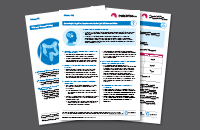 Full Guidelines
Full Guidelines
Click here to view article

 Tools
Tools


 Additional Documents
Additional Documents
Click here to see additional documents

 Endorsements
Endorsements
This Clinical Practice Guideline has been endorsed by the Nurse Practitioners’ Association of Canada (NPAC).

 Calculate by QxMD
Calculate by QxMD
This guideline and KT tool(s) are available on QxMD. Click here to download the app.
Summary of recommendations for clinicians and policy-makers
This guideline examines screening for esophageal adenocarcinoma (EAC) or its precursor conditions (i.e. Barrett esophagus (BE), dysplasia) in adults (>18 years) with chronic gastroesophageal reflux disease (GERD).
Evidence on screening for EAC was based on very low certainty outcomes. One retrospective cohort study compared screening to no screening and reported no benefit. Although patients with a prior esophagogastroduodenoscopy (EGD) were statistically more likely to have a lower stage of EAC, there were no statistically significant survival differences between screening and no screening. Two trials that compared screening modalities reported one serious adverse event from screening.
Some patients indicated a moderate willingness to be screened, based on their judgement of the benefits and harms). However, actual participation in screening trials was low. Additionally, screening all adults with chronic GERD would require substantial health care system-wide resources.
Given the limited availability of direct evidence on screening effectiveness, the task force also examined indirect evidence on the effectiveness of treatment for BE, dysplasia, or stage 1 EAC. An overview of systematic reviews showed that some endoscopic treatments may eradicate dysplasia, but the evidence ranged from very low to low-certainty.
Ideally, there would be well-designed RCTs examining the effects of screening versus no screening among chronic GERD patients. Barriers to feasibility, however, include the low prevalence of esophageal adenocarcinoma and limited probability that GERD patients will progress to cancer. More research to help understand which patients with chronic GERD are most likely to develop esophageal cancer is needed. Research that evaluates less invasive or less resource-intensive screening techniques (e.g., Cytosponge or other swallowed devices), or clarifies treatment effectiveness, is also necessary.
Because no evidence was found showing meaningful differences in survival or other patient important outcomes, the task force recommends against screening for EAC and its precursor conditions. The recommendation is strong because, in its evidence-to-decision framework, the task force placed a high value on the system-wide resources required to screen all chronic GERD patients without evidence of benefit.
Key Recommendation
- We recommend not screening adults (≥18 years) with chronic gastroesophageal reflux disease, for esophageal adenocarcinoma or its precursor conditions (i.e. Barrett esophagus or dysplasia) (strong recommendation; very low-certainty evidence).
This recommendation does not apply to people exhibiting alarm symptoms* or those diagnosed with BE (with or without dysplasia).
Although risk factors such as age (≥ 50 years), male sex, family history, white race or ethnicity, abdominal obesity and smoking may increase the risk for EAC, relevant trials and cohort studies did not include sufficient data within each category to support modifying our screening recommendation based on these factors, alone or in combination.
*Clinicians should be aware of alarm symptoms (e.g., dysphagia, odynophagia, recurrent vomiting, unexplained weight loss, anemia, loss of appetite or gastrointestinal bleeding) for EAC and evaluate, refer, and manage patients accordingly. They should also apply clinical judgement for the investigation and management of those unresponsive to GERD treatment or with symptoms suggestive of other upper gastrointestinal disorders (e.g. dyspepsia).
Additional Documents
ECRI Evaluation Scores
ECRI Guidelines Trust scores guidelines based on their adherence to the National Academy of Medicine Standards for Trustworthy Guidelines. Find the ECRI evaluation scores for this guideline here.




